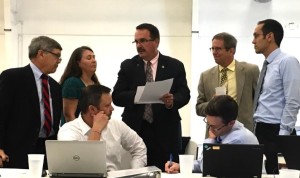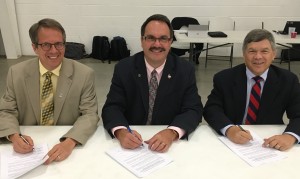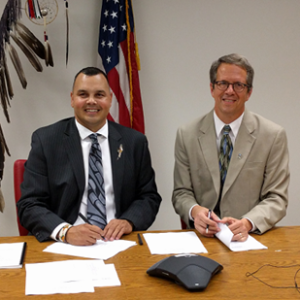Below is a note I sent to my staff at the Kansas Division of Water Resources last week to announces three recent water agreements that were signed during late August and early September resolving long-standing disputes.
Staff,
This last week, several of us had the pleasure of joining in a celebration of the State of Kansas and Kickapoo Tribe signing the Kickapoo water right settlement agreement. This comes close on the heels of our long-term agreements with Colorado and Nebraska on the Republican River Compact matters. Below is a bit more about each matter and links to more information on these and two other high-profile matters we are working through.
Thanks to all that staff that have been helping us work through these complex and time-consuming issues and to all of you who hold down the fort on our other important work as these things consume some of us.
David
Republican River Compact (RRC) agreements
Most of you are aware that the RRC has been taking a lot of time for several of us over the years (decades really). The late 1990’s through 2002 was one intense
period including our first trip to the U.S. Supreme Court on the RRC, which ended with a settlement of the matter in the Final Settlement Stipulation. Several years of relative quiet on the RRC followed. Then Nebraska violated the Settlement and we had to go back to the U.S. Supreme Court again (2010-2015). Concurrent with this court case, we had a number of additional disputes on Colorado’s and Nebraska’s compliance plans that we attempted to resolve unsuccessfully via non-binding arbitration.
In June 2014, with the Court case and arbitrations winding down, the States decided to try a new approach, entered into monthly discussions in an effort to reach agreements that would both provide appropriate credit in the Compact accounting for Colorado’s and Nebraska’s compliance activities while providing Kansas users the water they are entitled to in a way that maximizes its usefulness and minimizes waste.
After more than two years of negotiations among the States and numerous short-term agreements, at the August 24, 2016 RRCA annual meeting, the Administration approved two resolutions establishing long-term agreements among the states related to Colorado’s and Nebraska’s compliance activities in the Republican River basin. These long-term agreements align Colorado’s and Nebraska’s compliance activities with Kansas water user’s needs in both the South Fork Republican River of Northwest Kansas in the main stem Republican River of Northcentral Kansas.

We have the agreements and more background and explanation on our web site at: http://www.agriculture.ks.gov/divisions-programs/dwr/interstate-rivers-and-compacts/republican-river-compact
Kickapoo Tribal Water Right Settlement
The Kickapoo Tribe of northeast Kansas has a federal water right linked to the establishment of the reservation in 1832. Like the other Tribes in Kansas, as well as most in the U.S., this water right was not quantified. Over the last decade, the Tribe has been seeking to secure a more dependable supply for its current and future uses. Ultimately, disputes arose which led the Tribe to sue the state and federal government, with the issues of quantifying and protecting their right being among the issues in litigation.
Late last week the State of Kansas and Kickapoo Tribe signed the Kickapoo water right settlement agreement aimed to resolve these concerns. The settlement agreement quantifies the Kickapoo’s reserve water right and enumerates the state’s obligations to protect it. This is the first quantification of a Tribal Reserve water right in Kansas. Both the State and Tribe believe it to be a fair resolution of the matter.
The settlement is innovative in a number of respects, particularly:
- the method of quantification is not based on the use of the normal standard used in the West of “practicable irrigable acreage” but on a municipal build out concept using methods consistent with the Kansas law for Kansas water users, and

- the settlement includes a Memorandum of Agreement (MOA) between the State and Tribe which will be reviewed annually to make transparent the specifics of our administration and to keep it current as the Tribe develops storage.
Again, we have posted the settlement agreement with much more background on our web site at:http://www.agriculture.ks.gov/divisions-programs/dwr/interstate-rivers-and-compacts/kickapoo-indian-reservation.
Other on-going events:
We continue our work to determine how to remedy impairment that is occurring from groundwater pumping above the Quivira National Wildlife Refuge. See http://agriculture.ks.gov/divisions-programs/dwr/water-appropriation/impairment-complaints/quivira-national-wildlife-refuge
We are working through the process of evaluating the City of Hays changes applications from their R-9 Ranch (formally Circle-K) in Edwards County, which they are seeking to change for the long-term supply. When our process is complete, the Kansas Water Transfer Act Process will be triggered. See http://agriculture.ks.gov/divisions-programs/dwr/water-appropriation/change-applications/hays-change-and-water-transfer
